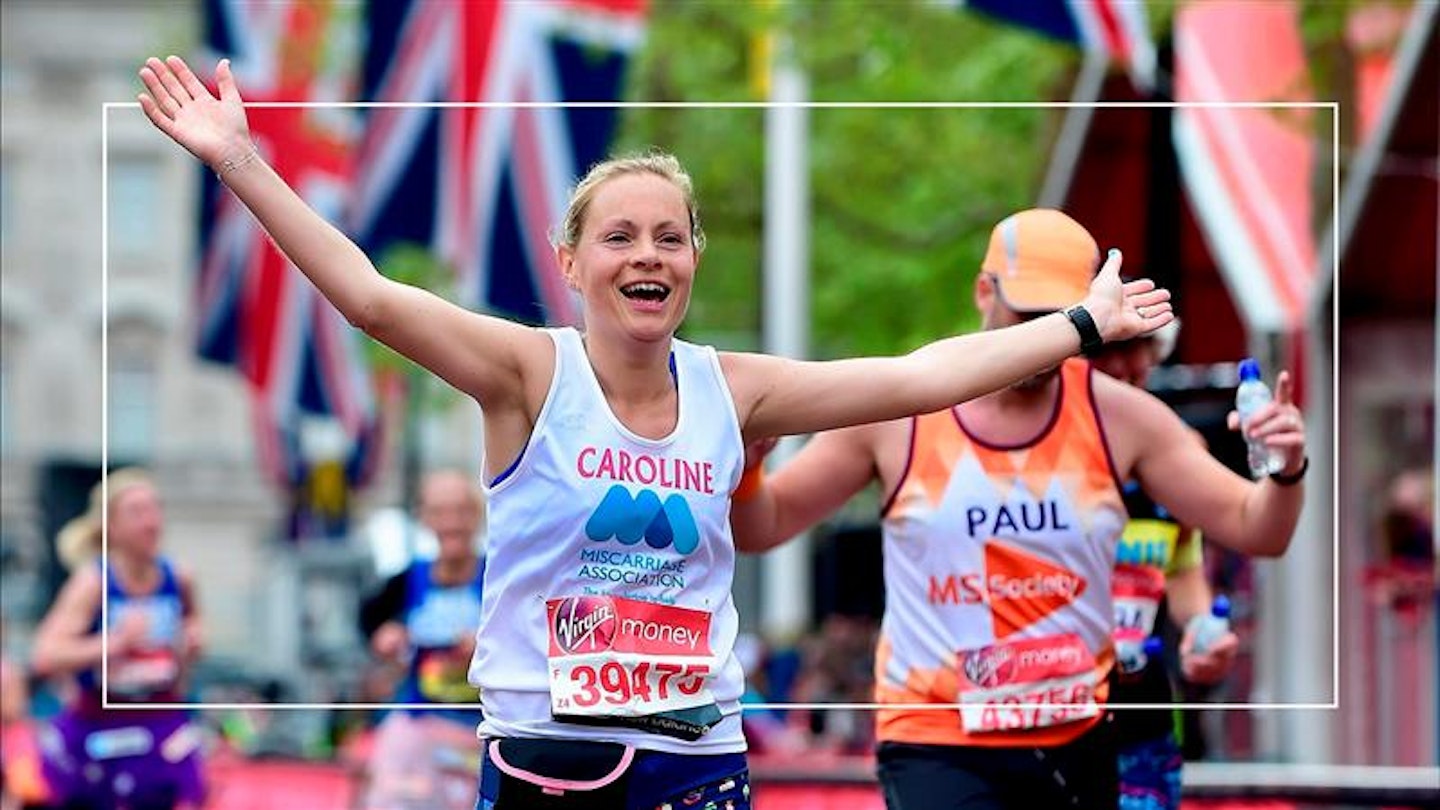‘I started running about five years ago – mainly because my husband started Couch to 5k,’ says Caroline Pocock, 39, from Norfolk, who is often found running either with her buggy or alongside her nine-year-old son. ‘Although I've always been sporty, up until that point I thought people who went running for fun were bonkers.’
Caroline’s husband never actually finished Couch to 5k, giving up after two weeks. Caroline, however, caught the running bug and in 2019 ran the London Marathon for the Miscarriage Association, and this weekend she’s running the London Landmarks Half Marathon for Tommy’s, a charity very close to her heart.
Tommy’s is the largest UK charity researching the causes and prevention of pregnancy complications, miscarriage, stillbirth, premature birth and neonatal death, helping to fund pioneering research. Their advice and support have been invaluable to Caroline, who has suffered seven miscarriages – five before the birth of her son, Zachary, in 2012, and two prior to giving birth to her second child, Rafferty, last year. Running, she says, has helped her deal with her grief because, ‘you can’t run and cry.’
‘I wish I'd started running before my first miscarriage, because it helps me deal with the grief,' explains Caroline. 'It gives me time to go out and process everything in my brain while I'm running.
'Having a miscarriage is horrendous – it doesn't matter whether you have one or 20, it's a horrible thing to go through and you want answers. You want to know why you've had one and whether you're likely to have another. Part of me wanted the doctors to say, “you've got this wrong with you, take this pill and then you'll be absolutely fine next time”. But they couldn’t find anything wrong, which of course was good news, but it also meant they couldn’t tell me if we would ever have a healthy pregnancy. It was very frustrating.'
Everyone will also tell you it’s not your fault, says Caroline, who says despite this it was impossible not to blame herself. ‘It made me feel worse finding out there was nothing physically wrong. I just thought, “well, if there's nothing wrong with me, what am I doing to make this happen? Did I eat the wrong thing? Did I do too much exercise? Did I lift a box that was too heavy?” Each time I became pregnant, I was terrified and ready for the bad news that I was going to lose it again. I lived in constant fear and I just thought my body can't have babies. It's not going to happen.’
Caroline describes this stage of her life as an ‘emotional roller coaster’, but after five miscarriages, she gave birth to her first child in 2012. ‘Despite everything my desire to become a mother never waned, and I felt very lucky to give birth to such a beautiful baby boy,’ she says.
Caroline’s seventh, and last, miscarriage was especially traumatic however – and ended in her being hospitalised. ‘I was 10 weeks pregnant, and everything was going well. One day I was working and I had that familiar feeling in my stomach and realised I was bleeding. I went to hospital, where a scan confirmed there was no heartbeat.’
Caroline was given a medical management tablet – medicine to help the pregnancy come away from the womb – but overnight, she began bleeding and went to hospital, where they discovered she has haemorrhaging.
After this, she decided it wasn’t worth trying again for another baby – ‘I didn’t want my little boy growing up without a mum’. But during the first lockdown in 2020, she discovered she was pregnant again. ‘I was terrified to tell my husband’, she remembers. ‘But we took it as a sign that we were getting another chance, and my second beautiful little boy was born in February 2021.’
Her last miscarriage triggered post-traumatic stress disorder (PTSD), where Caroline continues to relive the 24 hours around losing her baby. But along with CBT, running also helps her.
‘I start my runs by thinking “just put one foot in front of the other”. Once I've got that under control, my mind goes into a meditative state. Running is my time to let my brain go through all the pain and grief and emotions I've been holding onto,’ she says.
‘Running helps with flashbacks too, because it gets me outside and I can cry if I need to. During a run I'll replay what happened in those 24 hours, but when I get home it's all done, it’s compartmentalised in my brain, so I can walk through the door be OK to continue with my day,’ she says.
‘When I’m out running, I think about the babies I’ve lost. Sometimes, a robin will follow me around and I always think of the phrase, when robins appear, loved ones are near. So, when I see a robin pop up on the hedge, I’ll often talk to it and say “Hello, little robin, are you joining me today?” and I think about my babies following me, saying, “Go on, Mummy, keep running! You can do it”.’
If you need support and advice following a pregnancy loss, visit www.tommys.org. To sponsor Caroline in the London Landmarks Half Marathon in aid of Tommy’s, please visit here
